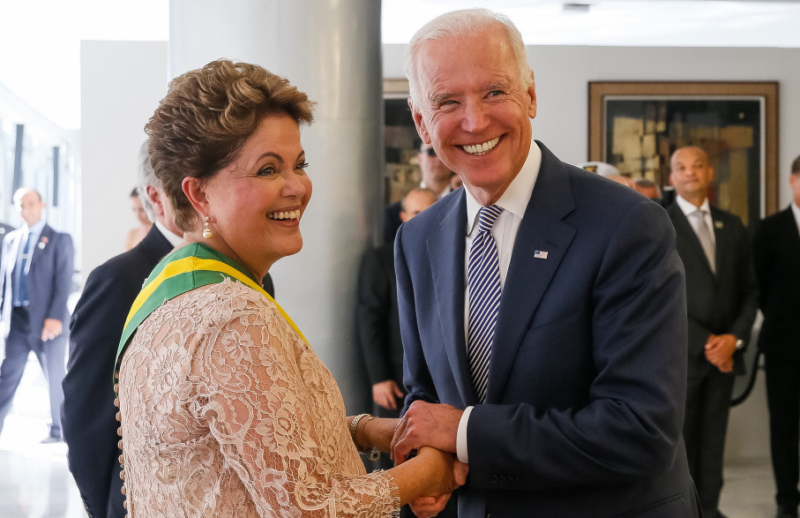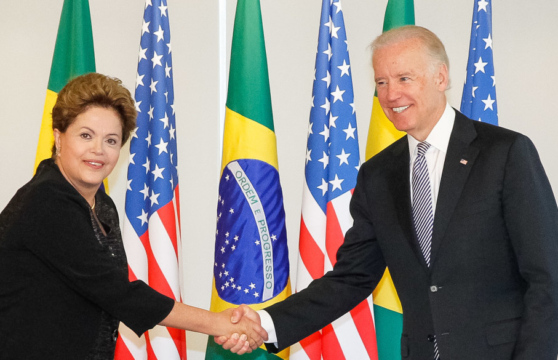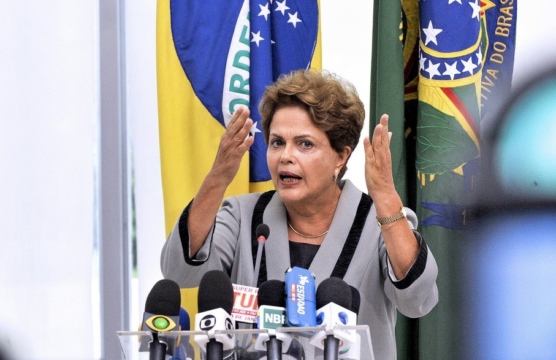Rousseff Should Leave US with a Trade Deal
President Rousseff is arriving in Washington on Monday to meet the US president. Nothing particularly important will happen.
After cheering the opening match victory of the US World Cup team, US Vice President Joe Biden traveled to Brasilia to meet with President Dilma Rousseff. Their encounter turned out to be yet another sign of the deterioration of USBrazil relations following the disclosure of US spying on Brazil a year ago. While Biden expressed confidence that US-Brazil relations would “return to normal", he gave no hint of how or when that might occur—and no suggestion of what he meant by “normal.”
The US vice president was far more optimistic after his meeting with President Rousseff a little more than a year ago. Back then, he asserted that 2013 would mark the “beginning of a new era US-Brazilian ties.” Although surely exaggerated, his enthusiasm had some basis. The Brazilian president had recently accepted a White House invitation for a state visit to Washington, viewed in Brazil as a welcome affirmation of Brazil’s international stature. Obama had previously honored only seven other world leaders with a state visit, all of them either close US allies or major global powers.
But several months later, the Brazilian president angrily called off her trip to Washington. This followed the disclosures of Edward Snowden that the US was secretly and massively spying on Brazil, and that the surveillance targets included Rousseff herself and Brazil’s state oil company. Relations were further strained, first, by Washington’s inattention or indifference to Brazilian complaints about the espionage. Subsequently, in what was widely viewed as a direct snub to the US, Brazil hurriedly decided, after almost a decade of delay, to purchase some $5 illion of Swedish-made fighter jets rather than US-manufactured Boeing planes. Since then the US-Brazilian relationship terms has frequently been portrayed as frozen or paralyzed.
Biden was only the second by a senior US official who traveled to Brazil this year, following Treasury Secretary Jacob Lew’s trip in March. The vice president brought no apologies or regrets for US spying or any strong promises that it would not occur again. Although prior to Biden’s arrival, she had suggested it was time to reset relations, the visit ended without a single public comment from President Rousseff or any other Brazilian official. Her vice president declined to join Biden in issuing a statement on the visit. Perhaps the Biden visit was badly timed, with the Brazilian president preoccupied by the World Cup, a weakening economy, and the ebbing of her popular support as this year’s elections approach. But, more likely, the limited results of their exchange realistically reflect the troubled state of US-Brazil relations, and should serve as a warning about continuing difficulties.
Biden was surely right to tone down expectations and offer the rather modest objective of a “return to normal.” But, for the US-Brazilian relationship “normal” is not a terribly high standard. Even before the Snowden affair, relations were hardly robust or particularly constructive. Despite repeated rhetoric to the contrary over many years, Brazil and the US have never cooperated very much, at least not for the past several decades. Even when their interests and goals have converged, the two nations have seldom sought to align their approaches or strategies.
Although expanded commercial ties have long been a central priority of both governments, for example, the US and Brazil have not negotiated a single major economic pact for nearly three decades. During that period the US has signed more than 20 free trade agreements worldwide, 11 of them with other Latin American governments. As the world’s two largest food exporters, Brazil and the US should be working together to lower barriers to agricultural trade worldwide. But agricultural trade issues have been a source of bitter dispute, not of collaboration. Cooperation has been equally elusive on other global matters of mutual interest, including nuclear nonproliferation, transnational crime challenges, and climate issues.
In Latin America, Brazilian policies over the past decade appear designed to downsize US influence in regional affairs. In South America, Brazil has sought to diminish the role of the Organization of American States and shift its political functions to exclusively Latin American institutions. Internationally, Brazil has pursued its aims by standing apart from the US. It has regularly emphasized and sometime trumpeted its disagreements with Washington. The US, for its part, often seems to consider Brazil an interloper in world affairs, a nation that does not quite measure up to the status and power it has achieved and whose foreign policy judgments are often uninformed and misguided. Washington is certainly not ready to champion Brazil’s aspiration for a permanent seat on the UN Security Council—a central priority on the country’s international agenda.
It goes without saying that Brazil and the US, the Western Hemisphere’s two giant nations, should be investing a great deal more in improving their relations and making them more productive. But, after two major clashes in three years—over Iran’s nuclear program and US spying, it also may be a good time for the two governments to openly acknowledge how troubled and precarious their relationship has become.
Although still unlikely, if current trends continue, the US and Brazil could wind up as strategic adversaries rather than strategic partners. Venezuela’s troubled and rapidly degenerating situation, for instance, could provide the spark for another serious clash. The two countries have to be more careful with each other. They now need to focus hard on keeping lines of communication open, stemming further deterioration, and averting new confrontations. That may well have been what the Biden visit was mainly about.
President Rousseff is arriving in Washington on Monday to meet the US president. Nothing particularly important will happen.
Dilma Rousseff indefinitely postponed her October state visit to the US; however, US-Brazil relations will not likely be profoundly affected by the diplomatic row.
President Dilma Rousseff, a political neophyte when she was took office in 2011, had a rough first term.
 Blog do Planalto / CC BY-NC-SA 2.0
Blog do Planalto / CC BY-NC-SA 2.0
 Video
Video
